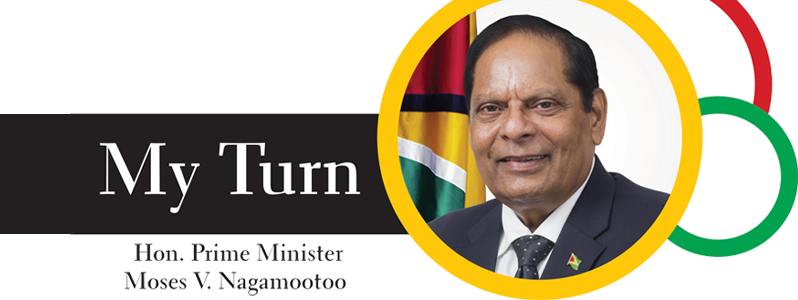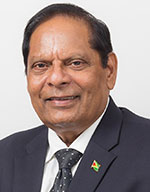By Moses V. Nagamootoo
Today, Guyana observes two significant events in the Indian calendar: Phagwah and the 100th year since indentureship ended. Guyanese of Indian origin, mainly Hindus, would celebrate both as a triumph of good over evil,
The observance of Phagwah or Holi, which is a national event, brings alive the ancestral presence from India, that started in 1838. The unique stamp of Indian, ethnic, culture has helped to shape our general outlook and mould our evolving Guyanese personality, a full century after the last Indian had set foot on Guyanese soil.
INDIAN FEET
Those Indian feet, and others from our indigenous, Amerindians, our African ancestors, our Chinese and Portuguese people, once planted in Guyana (then British Guiana) have formed the rock-like base of our nationhood.
Over the years, our Indian ethnicity and our Guyanese nationality seemed to have blended harmoniously and have defined descendants of Indian immigrants distinctly as Indo-Guyanese. We exhibit traits and peculiarities that were fashioned by our governance structure, history, geography and culture.
This was explained quite lucidly several years ago in a Stabroek News editorial titled, “The problem with Ethnic Identity” (May 15, 1999):
“We were a British colony for over 160 years. During that time, we absorbed an enormous amount of British culture, the language, the educational system and the literature…the legal system, the business and commercial practices, the structure of government.
“In the course of this long transition a lot of old culture rubbed off and we are now quite different creatures to our original countrymen who never left home as is readily proved by a quick visit to the land of our forefathers where we may find ourselves unable to speak the language, most certainly be treated as a foreigner and feel quite out of place in many ways.”
The apparent assimilation or creolization over time has resulted in the co-existence of “Indianness” and “Guyaneseness” and, sometimes, West Indian-ness. This remains a polemical issue and I don’t intend to stoke any emotional fire at this time, not today. It might be safe to say that culturally, we are inside the salad bowl, a mixture of several influences. As descendants of Indian immigrants, today’s Guyanese Indians, have imbibed much from Indian culture, and to a lesser extent, everything that was inherited and acquired from other ethnic groupings.
Indian festivities such as Phagwah, highlight the cultural inheritance from India and from the immigrants and their families who had crossed the kala pani. It is displayed by music, dance, dress, rituals, foods and symbolic gestures of warm embraces.
APPALLING POVERTY
While we celebrate, we must not lose sight of the fact that throughout the period of indentureship and afterwards, Indians lived under appalling poverty under the British plantocracy. However, historians have shown that through calculated withdrawal into their culture, Indians survived. Part of that culture was hard work, resistance and the tendency to save every penny for the “hard time.”
They also invested in children as economic future, which they have passed on to succeeding generations. This was also true for Indians in South Africa, Kenya, Uganda, Mauritius, Fiji, Burma, Trinidad, Suriname, Guyana and elsewhere in the so-called Indian diaspora.
. The preservation of Indian culture, however, was a saga of courage. In his epic book, Tigers in the Stars, Dr. Clem Seecharan documented the difficult work of Canadian missionaries to convert Indians in the early part of this century. Rev. E. H. Johnson noted this resistance among East Indians against “anything that appeared to draw their children away from their customs…” The good Reverend stressed that those Indians “seem to feel the need of vigorously preserving their national identity.”
RESISTANCE
That reference to “national identity” showed the affinity between the early Indians in British Guiana and their “Motherland.” It was not spontaneous. It was a form of resistance by Indians everywhere to the subjugation of India by the British, who simultaneously exploited Indians in the colonies.
There has been controversy recently over statements made by certain self-professed “Indian rights activists” for Indians to rise up. On other occasions, irresponsible and exaggerated claims have been made about “ethnic cleansing” against Indians in Guyana and additionally, blatant falsehoods have been peddled that Africans were attacking and plundering Indians and looting their women’s gold jewels. It does not promote the Indian personality to portray them falsely as victims, or to use the so-called victimhood as a reason for political agitation and promote racist mobilization.
Perhaps “rise up” sends the wrong message. But nothing is wrong with Indo-Guyanese standing up against perceived wrongs and injustices. Historically, resistance has become part of the Indian culture. It has demolished the caricature of any stereotype of Indian Guyanese being cowardly, or that they would acquiesce to oppression or corrupt rule, even when those were identified with their own ethnic leaders, as evidenced by the 2015 ouster of the Ramotar regime.
Short of staging “uprisings,” Indo-Guyanese have earned their place at all levels of the Guyanese society. Three Indo-Guyanese ascended to the highest office of Executive Presidents/Commanders-in-Chief of the Armed Forces, and one was elevated to the post of Prime Minister. Indians and their offsprings not only survived through the difficult era of bonded labour; they also prospered in all endeavours through initiative and thrift, for which our society is truly indebted to them.
George Lamming was to write in The West Indian People (1966) a special tribute when he commented:
“…those Indian hands –whether in British Guiana or Trinidad – have fed all of us. They are, perhaps, our only jewel of a true native thrift and industry. They have taught us by example the value of money; for they respect money as only people with a high sense of communal responsibility can.”
So, today, as we celebrate Phagwah and the 100th anniversary of the Abolition of Indian Indentureship, let us give praise to our ancestors, and let us continue to be imbued with their spirit of endurance, integrity and courage.
The writer, former journalist and lawyer, is Prime Minister of Guyana












